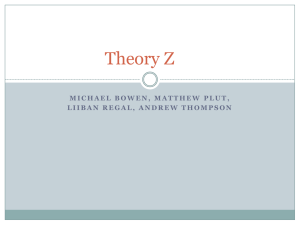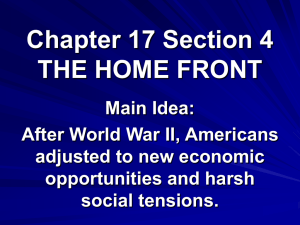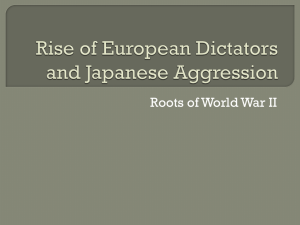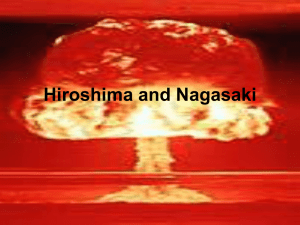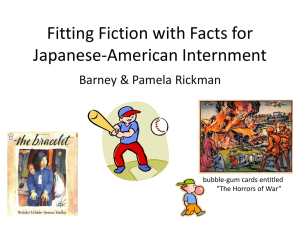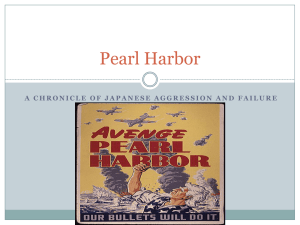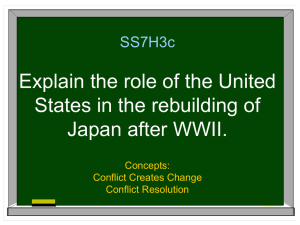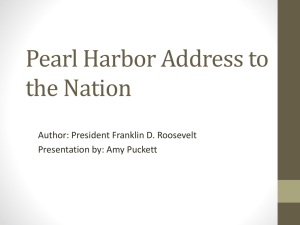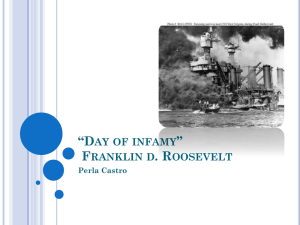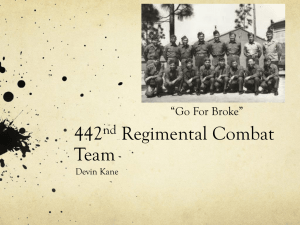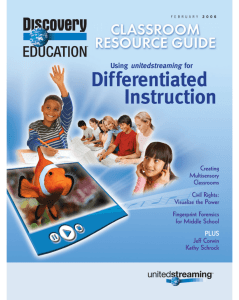WWII
advertisement
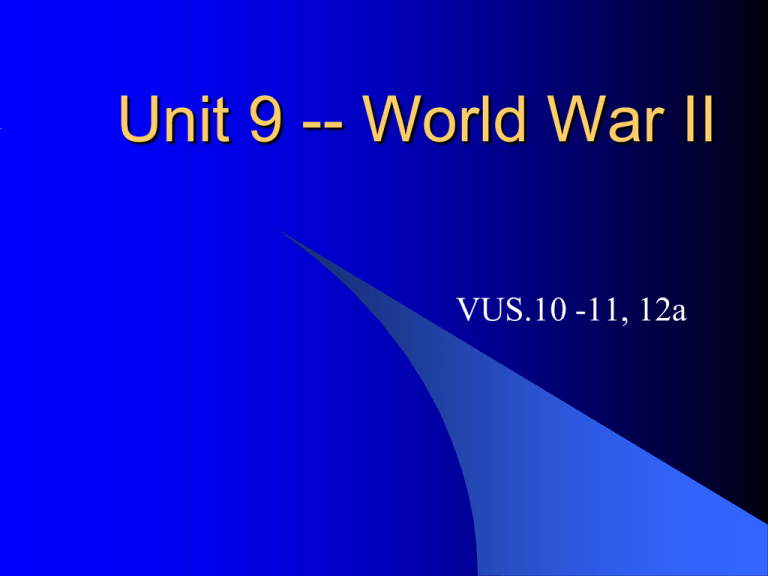
Unit 9 -- World War II VUS.10 -11, 12a WWII Vocabulary Adolf Hitler Lend-Lease Act Destroyers for bases deal Manchuria United Nations Midway Iwo Jima and Okinawa Hiroshima and Nagasaki Tuskegee Airmen Battle of Britain Dec. 7, 1941 island hopping El Alamein Stalingrad D-Day Nisei regiments Bataan Death March genocide Final Solution Nuremburg Trials rationing war bonds Marshall Plan Selective service Internment camp Geneva Convention World War II : the beginning (Europe) World War II officially began with Hitler’s invasion of Poland from the west in Sept.1939. Shortly after, the Soviet Union invaded Poland from the east, and the Baltic States. During the first two years, the US stayed officially neutral as Germany overran France, most of Europe, and pounded Britain from the air (The Battle of Britain) In mid-1941, Hitler turned on his former partner and invaded the Soviet Union Delete this frame, or insert a video from Unitedstreaming.com Despite strong isolationist sentiment at home, the US increasingly helped Britain. It gave war supplies (Lend-Lease) and old warships (Destroyers for bases) to Britain in exchange for military bases in the Caribbean and Bermuda. FDR compared it to –“ lending a garden hose to a next-door neighbor whose house is on fire” During the 1930s a militaristic Japan invaded and brutalized Manchuria and China as it sought military and economic domination over Asia The US refused to recognize Japanese conquests in Asia and imposed an embargo on oil and steel to Japan. TENSIONS The US and Japan negotiated to avoid war. While negotiating with the US, Japan carried out an air attack on the US naval base at Pearl Harbor, on DEC. 7TH, 1941 The attack killed several thousand Americans and destroyed much of the American Pacific fleet. Delete this frame, or insert a video from Unitedstreaming.com FDR called it: –“a date that will live in infamy” He will ask Congress to declare war on Japan. Hitler will honor a pact with Japan and declare war on the US. The debate over isolationism in the US was over. World War II was truly a world war now and the US was fully involved. Allied Strategy America and its Allies (Great Britain and the Soviet Union) followed a “Defeat Hitler First” strategy. Most American military resources were targeted for Europe. In the Pacific, American military strategy called for an “Island Hopping” campaign. The US would seize islands closer and closer to Japan and use them for air raids on Japan. We would also cut off Japanese supplies by using submarine warfare against Japanese shipping Germany’s strategy Germany hoped to defeat the Soviet Union quickly and gain control of their oil fields. Also hoped to force Britain out of the war with a bombing campaign and submarine warfare. Hoped to end it before American industrial and military strength could turn the tide Japan’s strategy Japan invaded the Philippines and Indonesia after Pearl Harbor. They planned to invade Australia and Hawaii. Japan’s leaders hoped America would accept Japanese predominance in South Asia and the Pacific rather than commit to a bloody costly war to reverse their gains Major Battles and Turning Points North Africa –El Alamein--German forces threatened to seize Egypt and the Suez Canal. The Germans were stopped by the British. **This prevented Germany from gaining access to Middle Eastern oil and possibly attacking the Soviets from the south Europe –Stalingrad--Hundreds of thousands of German soldiers were killed or captured in a month long siege of the Russian city .**This prevented Germany from capturing Soviet oil fields and turned the tide against Germany in the east –Normandy--(D-Day) American and Allied troops led by Gen. Dwight D. Eisenhower landed in German occupied France on June 6, 1944. Despite heavy German opposition and heavy American casualties, the landings were successful and the liberation of western Europe from Hitler had begun Delete this frame, or insert a video from Unitedstreaming.com Holocaust Genocide--the systematic and purposeful destruction of a racial, political, religious or cultural group Final Solution--Germany’s decision to exterminate all Jews Affected Groups –Jews Poles –Slavs Gypsies –Undesirables (homosexuals, mentally ill, political dissidents) Delete this frame, or insert a video from Unitedstreaming.com Delete this frame, or insert a video from Unitedstreaming.com Delete this frame, or insert a video from Unitedstreaming.com Insert Unitedstreaming video here. Significance--In the Nuremberg Trials, Nazi leaders and others were convicted of war crimes. The Nuremberg trials emphasized individual responsibility for actions during a war, regardless of orders received. The trials led to an increased demand for a Jewish homeland (Israel) A new Jewish country will be founded in 1948 Asia –Midway--In the “Miracle of Midway” American naval forces defeated a much larger Japanese naval force. A Japanese victory would have allowed the Japanese to invade Hawaii. The American victory ended the Japanese threat to Hawaii and began a series of victories in the island hopping campaign. Insert Unitedstreaming video here. Iwo Jima and Okinawa-American victories on the two island brought the US even closer to Japan but at the cost of thousands of American lives and even more Japanese lives. Japanese soldiers fought fiercely over every square inch of the islands and Japanese soldiers and civilians committed suicide rather than surrender Hiroshima and Nagasaki--because we faced terrible casualties of both the Americans and Japanese if we had to invade the Japanese home islands, President Truman ordered the use of the atomic bomb on both cities. **Tens of thousands of people were killed in both cities, but it convinced the Japanese leaders to surrender. Insert Unitedstreaming video here. Geneva Convention Attempted to ensure the humane treatment of prisoners of war. It established rules to be followed by all nations It still exists today. The treatment of prisoners in the Pacific often reflected the savagery of the fighting there. In the Bataan Death March-American POWs suffered brutal treatment by the Japanese after their surrender in the Philippines Japanese soldiers often committed suicide rather than surrender The treatment of prisoners in Europe more closely followed the ideas of the Geneva Convention Japanese Americans were relocated to internment camps Internment affected Japanese American populations along the West Coast. The Supreme Court upheld the government’s right to act against Japanese Americans living on the West Coast of the US. Reasons for internment 1. Strong anti-Japanese prejudice on the West Coast 2. False belief that Japanese Americans were aiding the enemy A public apology was eventually issued by the US government. Financial payment was made to survivors. War at HOME Success in the war required the total commitment of the nation’s resources. On the home front, public education and the mass media promoted nationalism Economic Resources--The US government and industry forged a close working relationship to allocate resources effectively 1. Rationing was used to maintain the supply of products essential to the war effort 2. War bonds and the income tax were used to finance the war. 3. Businesses retooled from peacetime to wartime production (ex.--car manufacturing to tank manufacturing) Human resources 1. More women and minorities entered the labor force as men entered the armed forces 2. Citizens volunteered in support of the war effort. Military Resources The draft/selective service was used to provide personnel for the military Minority participation African-Americans generally served in segregated military units and were assigned to non-combat roles. They demanded the right to serve in combat rather than support roles There were two all- minority units in particular--Tuskegee Airmen and Nisei regiments Tuskegee Airmen--AfricanAmerican pilots who served with distinction in Europe Insert Unitedstreaming video here. Nisei Regiments--AsianAmericans earned high number of decorations earned in fighting in Europe Communication codes of the Navajo Indians were used as code. It was an oral, not written, language *It was impossible for the Japanese to break Mexican-Americans fought but in non-segregated Minority units suffered high casualties and won numerous unit citations and individual medals for bravery in action Contributions to a war effort come from all segments of a society. Women entered into previously male job roles as African Americans and others struggled to obtain desegregation in the armed forces and end discriminatory hiring practices. Women increasingly participated in the work force to replace men serving in the military (ex.--Rosie the Riveter) They typically participated in the military in non-combat roles (WAACS and WAVES, and nurses) African Americans migrated to cities in search of jobs in the war plants They campaigned for victory in war and equality at home The US government maintained strict censorship of reporting the war. Public morale and ad campaigns kept Americans focused on the war effort The entertainment industry produced movies, plays, and shows that boosted morale and patriotic support for the war effort as well as portrayed the enemy in stereotypical ways. WW II aftermath The Soviet Union occupied most of Eastern and Central Europe, eastern Germany and North Korea German was divided (partitioned) into four zones. The US, Great Britain, France and the Soviet Union each controlled a zone The US, GB, and FR will combine their zones into a democratic selfgoverning country called West Germany East Germany will be created and dominated by the SU for the next 40+ years. It will be communistic Japan will also be occupied by the US. It will also adopt a democratic government based on the US model. It becomes a strong ally of the US in the region. Marshall Plan Because Europe lay in ruins, the US will launch an economic aid program called the Marshall Plan. We provided massive amounts of financial aid to rebuild Europe. We did this to prevent the spread of communism. United Nations A new world peace organization was formed near the end of WWII. It was to prevent future global wars. The US will play a prominent role in the UN. The UN’s headquarters are located in New York City.
